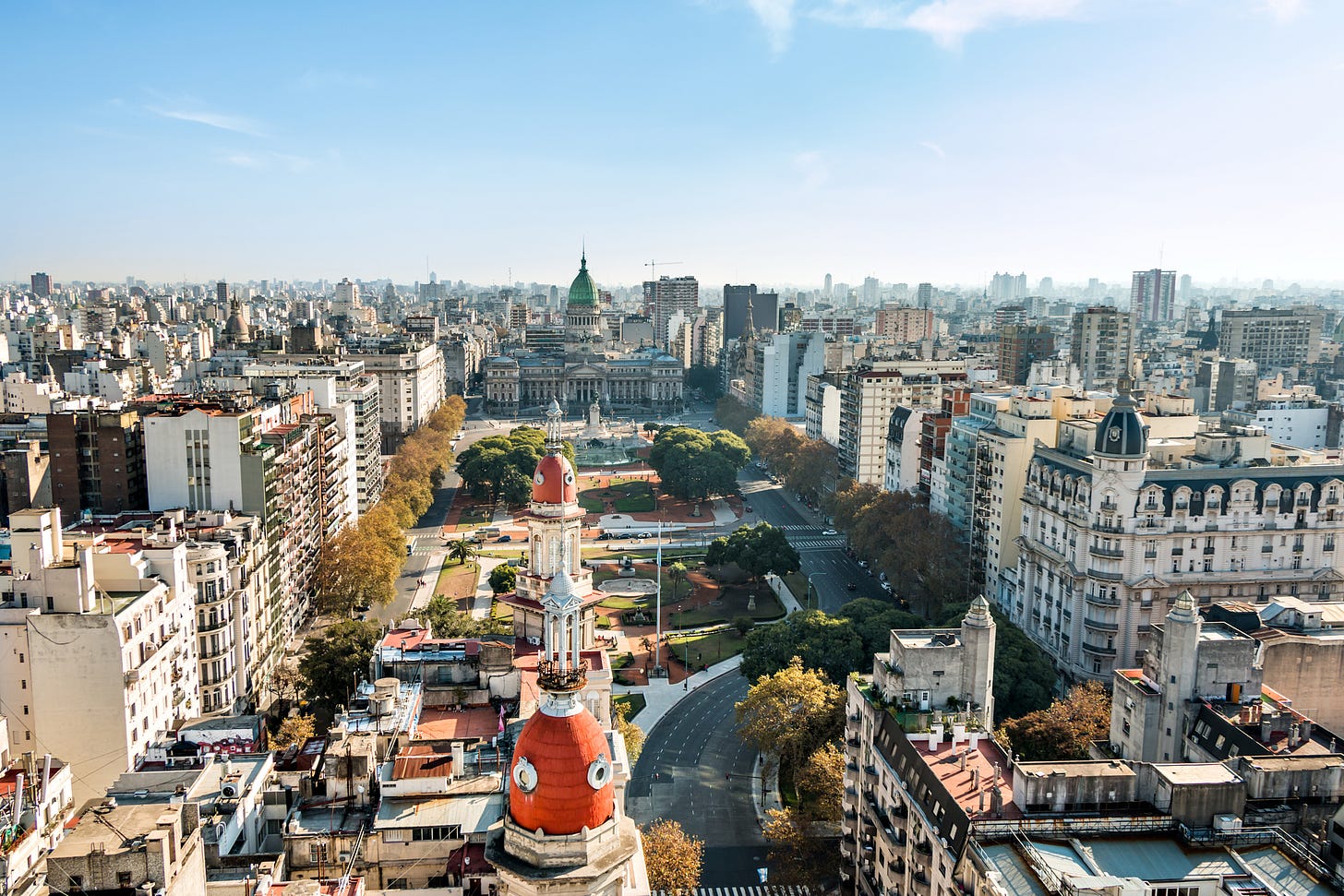Emerging Markets Daily - September 21
Xi Cracks Down on Chinese Capitalism, Lebanon Debt Restructuring, Argentina Politics Roils Bonds, Kazakhstan Rises as Crypto Miner, Evergrande Hits Bitcoin
The Top 5 Stories Shaping Emerging Markets from Global Media - Sept 21
Xi Jinping Aims to Rein in Chinese Capitalism, Harkening to Mao
Wall Street Journal
“Xi Jinping’s campaign against private enterprise, it is increasingly clear, is far more ambitious than meets the eye. The Chinese President is not just trying to rein in a few big tech and other companies and show who is boss in China.”
“He is trying to roll back China’s decades-long evolution toward Western-style capitalism and put the country on a different path entirely, a close examination of Mr. Xi’s writings and his discussions with party officials, and interviews with people involved in policy making, show.”
“For most of the 40 years after Deng Xiaoping first unleashed economic reforms in China, Communist Party leaders gave market forces wider room to flourish. That opening helped lift hundreds of millions of people out of poverty and created trillions of dollars in wealth, but also led to rampant corruption and eroded the ideological basis for continued Communist rule.”
“In Mr. Xi’s opinion, private capital now has been allowed to run amok, menacing the party’s legitimacy, officials familiar with his priorities say. The Wall Street Journal examination shows he is trying forcefully to get China back to the vision of Mao Zedong, who saw capitalism as a transitory phase on the road to socialism.”
“Mr. Xi isn’t planning to eradicate market forces, the Journal examination indicates. But he appears to want a state in which the party does more to steer flows of money, sets tighter parameters for entrepreneurs and investors and their ability to make profits, and exercises even more control over the economy than now. In essence, this suggests that he aims to rewrite the rules of business in what could someday be the world’s biggest economy.” Lingling Wei reports.
Foreign Creditors Urge New Lebanon Gov’t to Move on Debt Restructuring
The Daily Star of Lebanon/Reuters
“A group of Lebanon's bondholders, including some of the world's biggest investment funds, urged the new government on Tuesday to begin debt restructuring talks as soon as possible to help address a grave financial crisis.”
“Lebanon defaulted on its international debt in March 2020, after years of political upheaval and economic mismanagement left it unable to service a debt burden that was then worth more than 170% of GDP. After a year of political deadlock, a new government formed this month under Sunni Muslim tycoon Najib Mikati, with three-quarters of the population now in poverty after one of the deepest depressions of modern history.”
“The Lebanese pound has lost 90% of its value over the past two years, food prices have soared by over 550%, and worsening shortages of basic goods including fuel and medication are making daily life a struggle.”
“The creditor group said in a statement that it hoped for a rapid restructuring process, which would need the government to ‘engage meaningfully with the International Monetary Fund as well as Lebanon's international creditors and official sector partners…’”
“The creditor group includes the heavyweight funds Amundi, Ashmore, BlackRock, BlueBay, Fidelity and T-Rowe Price as well as a group of smaller hedge funds. It estimates it holds a ‘blocking stake’ of more than 25% in 40% of Lebanon's various bond series, making it a critical player in any restructuring.” The Daily Star and Reuters report.
Argentina Bonds and US-traded Equities Roiled by Political Crisis
Buenos Aires Times
“Argentina’s dollar bonds and US-traded equities slid on Monday, as President Alberto Fernández prepares to swear in new ministers and move past a week-long political crisis.”
“The nation’s US$10.5 billion in bonds due 2041 slipped as much as 1.4 cents to 36.8 cents on the dollar, while the unofficial peso exchange rate, known as the blue-chip swap, weakened 1.5 percent to 184 pesos per dollar. US-traded shares also fell as much as 13 percent, with the local benchmark index posting the worst returns among indexes in the Americas amid a global selloff.”
“‘We’re going to take steps that aim to respond to voters that have been affected by the pandemic,’ Fernández said at Monday’s swearing-in ceremony from the presidential palace in Buenos Aires. ‘We’re already working on it. I’m calling on our supporters to stand together and turn around last Sunday’s results.’”
“The Cabinet reshuffling, announced late Friday, is part of a move to try to put an end to a political crisis that has consumed the ruling coalition following a larger-than-expected defeat in primary elections on September 12. With the government weakened, the results of the vote cast uncertainty over the policy direction Fernández will take in the last two years of his mandate, and increase the chance he will lean on populist economic measures to win votes ahead of November’s midterms, according to Bloomberg Economics.” Buenos Aires Times reports.
Kazakhstan Emerges as Third Busiest Crypto Mining Center
bne IntelliNews
“Kazakhstan’s sudden rise to third place in the cryptocurrency mining industry, trailing only the US and China, did not go unnoticed—it was headline-making crackdowns on crypto mining in China, driven by officials concerned at the sheer volumes of electricity the industry sucks from the grid, that moved firms to relocate in droves to the neighbouring Central Asian nation, drawn in part by cheap electricity rates."
"Cambridge University research published on July 15 by the Cambridge Centre for Alternative Finance showed that China’s share of global bitcoin mining lately plunged to 46%, down from 75.5% in September 2019. This boosted Kazakhstan to the ranking of third largest player in bitcoin mining, with multiple firms essentially fleeing to Kazakhstan to live on beyond Beijing’s crackdowns.”
“Those who fled included one of China’s largest miners, BIT Mining…In July, BIT Mining bought an additional 2,500 machines with a value of around $6.6mn for deployment to its data centre in Kazakhstan to expand the company’s theoretical hash rate capacity by 165 PH/s.”
“A host of other deals in the Kazakh crypto mining sector took place within the span of June and July. Chinese firm Canaan, one of the world’s largest manufacturers of cryptocurrency mining machines—specifically, ASIC mining machines that operate by solving the complex mathematical equations needed to confirm blockchain network transactions—said in June that it had set up a base of operations in the ex-Soviet state.” Kant Shaku reports.
Bitcoin, Other Crypto Fall on Evergrande Crisis
CNN Business
“Bitcoin isfalling as fears of the Evergrande crisis sweep through global markets. The digital currency hasdropped 5.7% in the last 24 hours, and was trading at $42,955 per coin as of 2:43 am ET on Tuesday, according to cryptocurrency tracker Coindesk.”
“Earlier, it was down as much as 12%. Other cryptocurrencies are tumbling, too. Ethereum and dogecoin have each declined 4.4% and about 6%, respectively, in the past 24 hours…”
“Edward Moya, senior market analyst of the Americas at Oanda, said on Monday that bitcoin was no different from other assets. ‘The fallout from the Evergrande is putting a tremendous dent in risk appetite that is sending everything lower,’ he wrote in a note to clients…”
“Others have taken the occasion to double down. Nayib Bukele, the president of El Salvador who is known for his bullish stance on bitcoin, tweeted Monday that ‘we just bought the dip.’ The country purchased 150 bitcoins, and now holds 700 coins, he added.” CNN Business reports.
“How did you go bankrupt?” Bill asked.
“Two ways,” Mike said. “Gradually, then suddenly.”From Ernest Hemingway’s The Sun Also Rises




